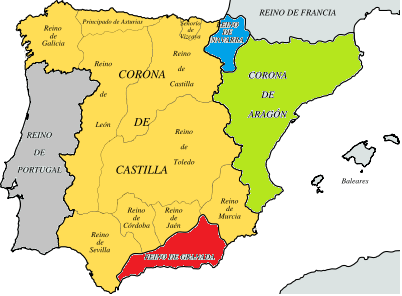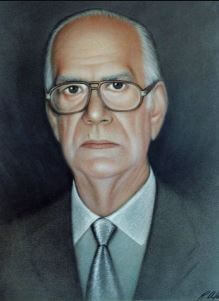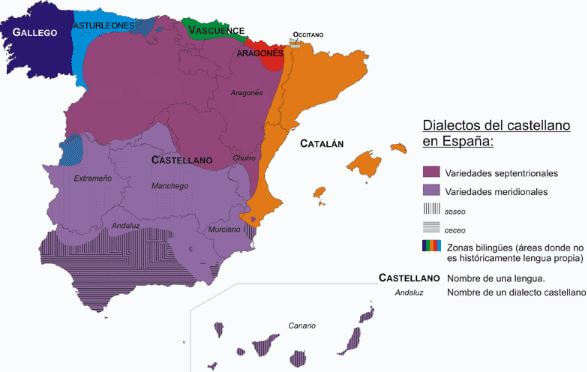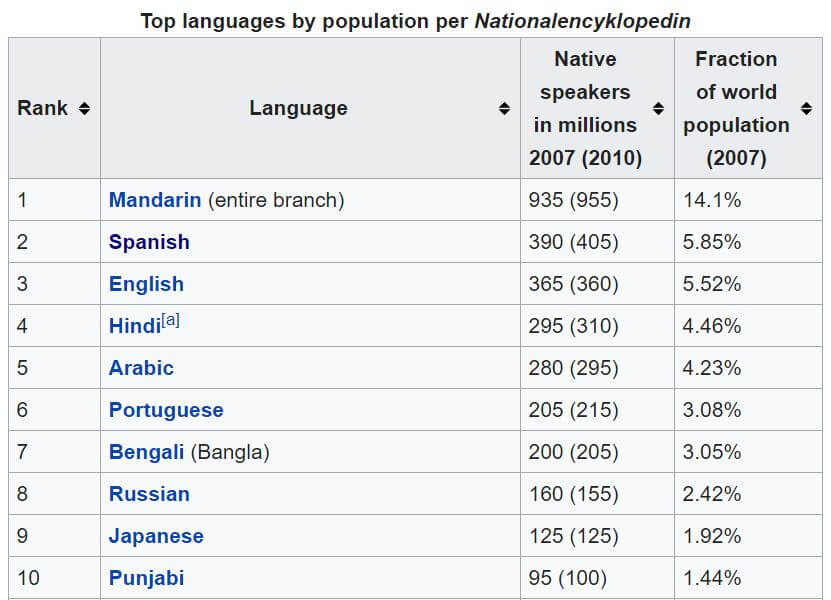If you are new to the Spanish language, you might have wondered why sometimes people say “Do you speak Español?”. Let’s see what they mean by that.
What’s the difference between Español and Spanish?
The only difference between “Español” and “Spanish” is that one is a Spanish word while the other is an English word. Both words have the same meaning. “Español” is how you say “Spanish” in the Spanish language.
So the phrase “Do you speak Español?” really means: “Do you speak Spanish?” To which an appropriate answer would be: “No, no hablo Español”, or “No, I don’t speak Español”.
Another common name you will hear for Spanish instead of Español is “Castellano”. Castellano means “Spanish” and it is a frequent last name among people in Latin America. It really means “from Castile”, a historical region in Spain, where the language we speak took form.
Where is the Castile region of Spain?
Castilla is located in the central part of the Iberian Peninsula, in Spain, occupying most of the southern sub-plateau. Castilla has a rich artistic and natural heritage, including three cities declared by UNESCO as a World Heritage Site.
 Map of Spain, Castile in yellow
Map of Spain, Castile in yellow
¿Español Language or Castellano Language?
This Romance language, derived from Latin and belongs to the Italian subfamily within the Indo-European set; it is the language of Spain and of the nations of South and Central America -except Brazil, the Guianas, and Belize-, and, in the Caribbean, of Cuba, Puerto Rico and the Dominican Republic; It has some four hundred million speakers, including Hispanics living in the United States and some hundreds of thousands of Filipinos, as well as Saharan national groups and Equatorial Guineans on the West African coast.
The official language of many of the Latin American countries, according to the respective constitutions, is Spanish. However, other countries call Castellano to its official language, in allusion to the province of Castile, in Spain, where the language of the peninsula originated.
Controversy among the terms Castellano and Español
This language is called Castilian, for being the name of the linguistic community that spoke this Romanesque modality in medieval times: Castilla. There is some controversy surrounding the denomination of the language; the term “Spanish” is relatively recent and is not admitted by the many bilingual speakers of the Spanish State, since they understand that Spanish includes languages like Valencian, Galician, Catalan, and Basque, which were also originated in Spain and are considered official within the territory of their respective autonomous communities. It is these bilingual speakers who started favoring the use of its most ancient name: Castilian, meaning ‘the language of Castile’.
“Castillian” More Appropriate
The Franco regime tried to violently impose Castilian to the Iberian minorities and speakers of other languages and decreed that the language be called “ Spanish “, identifying it with the State of the same name. However, there are several reasons to consider the term “Castilian” more appropriate:
 Francisco Franco in Spain, 1939
Francisco Franco in Spain, 1939
When the language reached maturity, there was no national entity known as “Spain”, there was a multinational empire in which many languages were spoken. When the Spanish State was born, it absorbed other countries that spoke Spanish, in some cases for several centuries.
When the Royal Spanish Academy was founded (1713 in Spain)., its founding members used the name “Lengua Española” as the official denomination.
Español is spoken in Latin America
Spain never played the role of a cultural and economic metropolis in relation to the now Spanish-speaking American States, except probably in relation to Cuba.
In Latin American countries, the term Castellano has been used for centuries and does not pose special difficulty when understanding the terms Castellano and Español as synonyms.
Amado Alonso studied this complex question in a book called “Castellano, Español, national language. Spiritual history of three names” (1943). Going back to using the term Español represents going back to our origins and it would bring great satisfaction to the Ibero-American authors who dedicated so much effort writing and studying it, such as Andrés Bello, J. Cuervo or Argentinian author Mabel Manacorda de Rossetti.
Forsaking “Español”
To renounce the term Español would mean to recognize the true character of a language that has been so hit by influences and tolerances and which led to its current condition. On the other hand, Spaniards have the right to call their language Spanish, as well as the Argentines, Venezuelans, Mexicans, or Panamanians, to describe it as Argentine, Venezuelan, Mexican or Panamanian, to name a few examples. This would be a step towards the fragmentation of a language, which occupies the third place among the most spoken languages of the world. That is 19 countries with more than 300 million inhabitants, that is a 5 percent of the world’s population.
Catalan and Galician are two other languages spoken in Spain, emerging as languages of the Romanesque branch; and Basque, of controversial origin, is also native to Spain.
Many famous Spanish speakers consider Castellano, or Español, to be the richest language in the world.
Famous Writers Speak on the Question
There are opinions in favor and against the denomination of Castellano or Español, following a statement of the late Camilo José Cela, Other famous authors and academics shared their opinion to an issue that goes well back in time and never seems to end. Let’s see their opinions.
Camilo José Cela
 Camilo Jose Cela
Camilo Jose Cela
The very Nobel Laureate Camilo José Cela dedicated a part of his work to defend the use of “Español”, warning about the danger of the loss of «a certain idea» of the language. The writer lashed out against those who “are ashamed to speak Español and call it by his name, preferring to say Castellano”.
Jon Juaristi
The director of the Cervantes Institute considers that the “Español-Castellano” confrontation “is a problem that arises mainly in the field of Catalan and Basque nationalism, so I would not like to turn it into a new reason for confrontation”. Among the nationalists, paradoxically, I sometimes hear the same arguments from the detractors of one term and those of another. I prefer to speak of “Español”, and also, as director of Cervantes, the correct thing is to say “Español”“.
Mario Vargas Llosa
The renowned author of La Ciudad y los Perros supported Cela’s opinion that Español is preferred over Castellano and added his personal bias towards “Hispanoamérica” over “Latinoamérica”. “These are intolerant attitudes that do not correspond at all to a spoken language in so many continents and by so many people”.
Francisco Rico
For the historian and academic, the diatribe between the use of the Castilian and Spanish concept does not exist as such. “They mean the same thing in ordinary language. Many times, to avoid repeating a word, we use one or the other. Although sometimes there are people who can make use of them with a second intention in a specific context. For the rest, there is no more controversy. “
José Antonio Marina
The philosopher opts for the term Castellano because, in his opinion, it “is humble, not very imperial and compatible with many other languages, and because I believe that Spain is a historical chance, the reason why there is neither glory nor disdain. But the truth, this subject seems to be an irrelevant matter”.
Santos Sanz Villanueva
According to the professor of Spanish Literature, “from a historical point of view, Castellano designates a peninsular dialect of Romanesque origin, different from others of the same origin as Aragonese or Riojano. “Spanish” goes on to cover later the set of those dialectal modalities spoken in the Peninsula. Except, then, in a technical sense, the term “Spanish” is preferable when referring to the majority language spoken in the Peninsula that includes varieties such as Andalusian, Murcian, Canarian…“.
 Dialects and languages of Spain
Dialects and languages of Spain
Luis Antonio de Villena
According to the poet, novelist and essayist, the criticism described by Camilo José Cela is a theme that is getting old and that has already occurred in the 50s in Latin America. “There is a book by the philologist Amado Alonso, ‘Castellano, Español, idioma nacional’__, where he already addressed this issue. In this text, Alonso referred to how some American Constitutions avoided talking about Español, instead using a euphemism, “national language.” What Cela now raises is similar. Spanish has overcome the geographical borders of Castillian, therefore, the precise way to call it would be ‘Español’, without connotations “.
Juan Bonilla
The novelist seems to thik this is a completely insignificant question: “To deduce cowardice from the use of the word “Castellano” seems to be a perfect dullness. For my part, I always use the word “Español”. But the important thing is that when a foreigner tells me that he knows how to speak Castellano, I understand perfectly what he wants to say to me”.
Soledad Puértolas
The writer does not see such controversy in the use of the concepts “Castellano” or “Español” to designate our language: “Each one refers to the language as they are most comfortable. I am neutral in this supposed controversy and the political connotations do not affect me”.
Lorenzo Silva
The novelist show interest, not in choosing one denomination over the other, but in that people understand what is being talked about. “For the common people, both terms are valid. And it does not cause shame or pride. Spanish is a language that was born in Spain and it is in Castile where the cradle of the language is located.”
This discussion between calling our language Castellano or Español still exists today. But its ability to mix and synthesize with other languages and dialects, the will to communicate and unite people maintaining a cultured and unified language, these are the fundamental bases that make Spanish a language of universal culture and communication.
Conclusion
And regarding the difference between Español and Spanish, there isn’t any. Both words mean the same, only in different languages. Español is simply how you say Spanish in Spanish.
Hopefully, Español or Spanish represents not only an extraordinary past but, rather, a future full of promises and responsibilities. With over four hundred million speakers, which will amount to five hundred million, approximately, by the end of the current century, Spanish is the second most spoken language in the world, only after Mandarin Chinese. And this is precisely what we must take into account, and not engage in banal discussions.
 Most spoken languages in the world
Most spoken languages in the world





